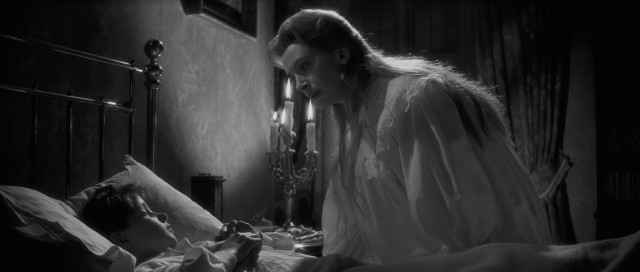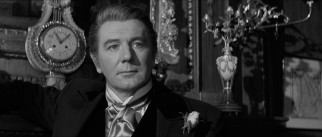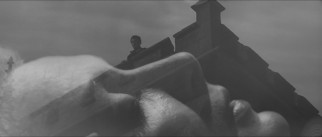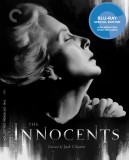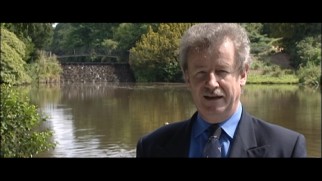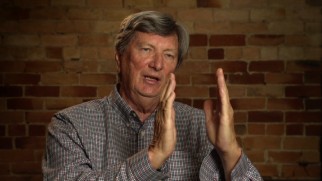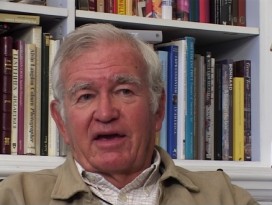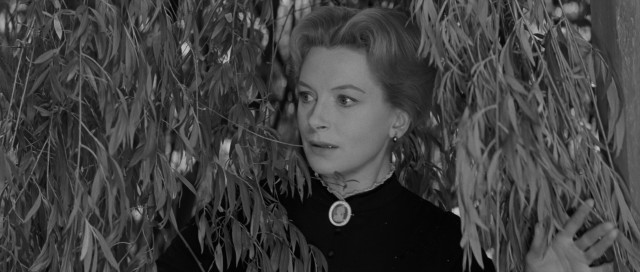The Innocents: The Criterion Collection Blu-ray Review
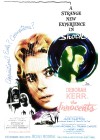 |
The Innocents
US Theatrical Release: December 25, 1961 / Running Time: 100 Minutes / Rating: Not Rated Director: Jack Clayton / Writers: Henry James (novel The Turn of the Screw); William Archibald, Truman Capote (screenplay); John Mortimer (additional scenes & dialogue) Cast: Deborah Kerr (Miss Giddens), Peter Wyngarde (Peter Quint), Megs Jenkins (Mrs. Grose), Michael Redgrave (The Uncle), Martin Stephens (Miles), Pamela Franklin (Flora), Clytie Jessop (Miss Mary Jessel), Isla Cameron (Anna) |
Buy The Innocents from Amazon.com: Criterion Blu-ray • Criterion DVD • Fox DVD
Nowadays, it feels like one out of every three horror movies involves ghosts. It wasn't always like that. The trailer for 1961's The Innocents pitches the film as something novel: a ghost story for adults. While calling it the first of its kind is a bit of an exaggeration, The Innocents is no B-movie. If so, it would be out of place, though not without precedent, in The Criterion Collection, which it enters this week on Blu-ray and DVD bearing spine number 727. This British black and white CinemaScope picture stars Deborah Kerr, fresh off her sixth Academy Award nomination for Lead Actress. It adapts the 1898 novel The Turn of the Screw by Henry James and boasts Truman Capote as its primary screenwriter. The film hailed from Twentieth Century Fox, who gave it a Christmas Day opening in the United States. The production seems more akin to such esteemed modern films as The Sixth Sense and The Others than to contemporaries from the likes of Roger Corman and Ed Wood.
Instead of the usual, iconic Alfred Newman fanfare, the film sets its opening Fox logo to the eerie sound of a girl singing. There are distressed whispers and disembodied hands clenched as if in prayer. It's all a bit jarring and prepares us to expect something supernatural. There's nothing of the sort in the first scene, which finds Miss Giddens (Kerr) being interviewed for a governess position, her first. Doing the hiring is a worldly bachelor (Michael Redgrave) who is a distant uncle to the two young children in need of some love, care, and guidance.
Giddens gets the job and is instantly blown away by her new home and workplace. The idyllic country mansion Bly is home to a few staff members and to Flora (Pamela Franklin), a well-behaved girl with a pet tortoise named Rupert. Flora's brother Miles (Martin Stephens) is away at boarding school, but a note soon arrives from London, forwarded by the busy and bother-averted uncle, that Miles has been expelled. The reasons given for this punishment are vague but enough to trouble Giddens.
Miles' expulsion is far from the only mystery factoring into Miss Giddens' restless nights. There seems to be more to the death of the children's previous governess than the housekeeper Mrs. Grose (Megs Jenkins) is letting on. Something seems off with the children, especially Miles, who seems capable of danger. Miss Giddens even begins seeing people: a man on the roof, a woman out by the lake. She hears laughs and cries. There is the genuine possibility that Giddens is simply losing her mind. But that would explain everything less than the governess' hypothesis: that the children are being possessed by the late previous governess and her abusive boyfriend.
The second film directed by Jack Clayton, who specialized less in horror than literary adaptations (subsequent ones including 1974's The Great Gatsby and Disney's Something Wicked This Way Comes), The Innocents is creepy, atmospheric, absorbing. In short, it's everything you hope to get (but rarely do) from a horror movie. James' gothic story is a key source of appeal, but the filming adds much of its own allure with its stylish and suspenseful execution.
One of the rare films to combine CinemaScope and black & white, two formats that were being phased out at the time (one temporarily, one permanently), The Innocents is a feast visually. At any given time, much of the frame is pitch-black, creating a nice and cinematic contrast. Clayton captures the spacious location (at which all but the opening scene takes place) with fluid, mobile camerawork and a minimum of cuts. The small cast is uniformly good. Kerr is someone I wouldn't have imagined to have starred in a horror movie while in her prime. The leading lady of such decorated and traditional dramas as The King and I, An Affair to Remember, and From Here to Eternity, she is surprisingly right for the movie and vice-versa. It helps that she made this when still seemingly in demand and not as a desperate push for relevance (although, aged 40 at the film's release, her days of stardom were numbered). The two child actors impress thoroughly, especially the chilling Stephens, who would get out of the business at 17. The slightly younger Franklin (making her debut) stuck around longer, though British movies gave way to a lot of American television, from which she retired in 1981 at age 31.
Horror movies rarely receive industry recognition. You can count the number of Best Picture nominees from the genre on three fingers (and that's assuming you stretch and count The Silence of the Lambs). The Innocents faced the same biases in its time, although it did still manage to pick some nominations from the BAFTAs and a couple of guilds, as well as commendations from the National Board of Review, an Edgar Allan Poe Award, and a competitive exhibition at the 1962 Cannes Film Festival. The admission into Criterion's ranks may be its most significant achievement to date and should help this worthwhile film add to its considerable number of fans.
VIDEO and AUDIO Criterion probably didn't have to work too much magic to make The Innocents look as delightful as it does here. The Blu-ray's 2.35:1 picture leaves nothing to be desired. The image loses focus on occasion, but the element remains strong, sharp, clean, and well-defined. The black & white photography has such a tremendous level of detail that it almost seems like it has hints of color in characters' irises. Always crisp and intelligible, plus often atmospheric, the LPCM 1.0 monaural soundtrack also elicits nothing but satisfaction.
BONUS FEATURES, MENUS, PACKAGING and DESIGN The Blu-ray's extras begin with an audio commentary by cultural historian Christopher Frayling, recorded in 2006 (this release seems to have been nearly a decade in the making). Frayling keeps this academic track flowing at all times, having either inside information or thoughtful observation to share about virtually every scene. On the video side, where all is encoded in HD, we start with an introduction (23:19) taped by Frayling in 2006 at the site of the film's locations. As in the commentary, he has all sorts of information about the film, its makers, and interpretations of Henry James' story. "John Bailey on The Innocents" (18:54) has the comedy cinematographer (Groundhog Day, As Good As It Gets) discuss Freddie Francis' compositions on the film. Clips from the film often play under and complement his specific comments and observations, recorded in 2014.
2006 interviews with Francis himself (who died in 2007), editor Jim Clark, and script supervisor Pamela Mann Francis comprise "Between Horror, Fear and Beauty" (13:48). Led by Clark, these valuable, primarily technical reflections are also complemented by apt film clips, stills, and some behind-the-scenes photography. Finally, we get The Innocents's rough-looking original theatrical trailer (2:49), which I mentioned at the top of this review. It likes repeating the same question (pictured above) again and again. The menu attaches score (and some giggles) to a static shot. Need I even mention that the disc supports bookmarks and gives you the chance to resume playback of anything and everything? Of course, it does. Criterion rocks. In typical Criterion fashion, the disc is packaged in a clear keepcase with the thickness of a DVD case but the height of a Blu-ray one. The obligatory booklet is not staple-bound, instead folding open to twelve pages. Half of those go to "Forbidden Games", an informative essay by writer Maitland McDonagh. It not only analyzes the film, but compares it to the source text and gives us further information about the director, cast, and the cinematographer who conceived a compromise between Clayton's desired Academy Ratio and the CinemaScope ratio the studio demanded.
CLOSING THOUGHTS The Innocents is an old horror film you should know, but probably don't. Criterion makes it easier than ever before to know and appreciate this skillful and unsettling tale with the utmost A/V quality, a strong audio commentary, and a fine hour of video extras. Whether you're looking for a new Halloween night fright or simply wanting to grow your Criterion collection, this splendid disc deserves your attention. Buy The Innocents from Amazon.com: Criterion Blu-ray / Criterion DVD / Fox DVD
|
Related Reviews:
DVDizzy.com | DVD and Blu-ray Reviews | New and Upcoming DVD & Blu-ray Schedule | Upcoming Cover Art | Search This Site
Deborah Kerr: Heaven Knows, Mr. Allison • From Here to Eternity • An Affair to Remember
Directed by Jack Clayton: Something Wicked This Way Comes | Megs Jenkins: Oliver! | Michael Redgrave: The Lady Vanishes
1960s: Rosemary's Baby • Mary Poppins • Hand in Hand • The Apartment • The Moon-Spinners • Seconds
The Uninvited • Rebecca • House of Wax • The Ghost and Mrs. Muir • The Conjuring
New: Love Streams • Lady for a Day • Man Hunt • Godzilla • Dead Within
